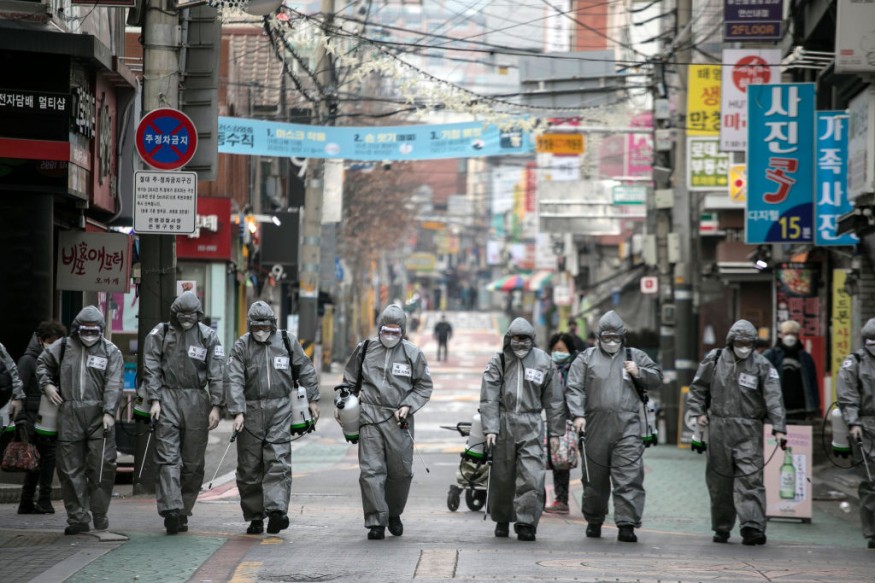Experts warn that the United States is still far from reaching some herd immunity as the country recorded millions of COVID-19 cases.
While more than 14 percent of the U.S. population was contaminated with SARS-CoV-2 by mid-November last year, experts said in the JAMA Network Open that a significant distance exists until the country can meet herd immunity.
Since then, outbreak rates have soared throughout the United States, and more than 20.8 million confirmed cases have been reported as of Tuesday, according to a count held regular by The New York Times.
Even so, Americans remain miles removed from herd immunity, one specialist said, so it remains crucial to introduce a national vaccine program.
Dr. Amesh Adalja, an infectious disease expert and senior scholar at the Johns Hopkins Center for Health Security in Baltimore, said that most areas of the nation had not attained herd immunity. The expert added there had been a substantial underestimate of the true burden of COVID-19 disease.
What is Herd Immunity?
Herd immunity is where several persons become resistant to an infectious infection in a population, which makes it less likely to propagate. This helps protect the whole population, including newborns and people with weakened immune systems, which are at greater risk of disease-related hazardous health complications.
To gain herd immunity, the number of individuals resistant to the disease must outweigh the number of people who can still catch the disease, called the herd immunity threshold. Typically, based on how infectious it is, this involves between 50 to 90 percent of the community.
James Wantuck, MD, an internal medicine expert and chief medical officer of PlushCare, told Business Insider that while not 100% of the populace is resistant, there are not enough individuals remaining to transmit it in order to maintain the virus. It means that, with time, the epidemic actually eliminates from the population.
How to Get The Herd Immunity?

For any specific illness, there are two primary strategies for achieving herd immunity:
Immunization
Vaccines are the best and most ideal means of obtaining herd immunity, and diseases such as polio, smallpox, and measles have been effectively regulated. The number of measles deaths worldwide fell 79 percent from 2000 to 2014, saving around 17.1 million lives.
In general, vaccinations include inactive or weakened parts of the germ that cause the disease. This makes it possible for your body to generate antibodies and build memory cells that enable you to continue battling this germ in the future.
Connie Steed, MSN, RN, CIC, FAPIC, president of the Infection Prevention and Epidemiology Professionals Group, told Business Insider that enough people are protected from contagious pathogens from others who are prone and may not be vaccinated so the germ would not be able to 'find' those susceptible persons.
But for this approach to operate, a significant number of persons must take the vaccine. For example, approximately 95 percent of citizens ought to be vaccinated in order to eradicate measles, this has not been entirely accomplished. Health authorities predict that between 70 percent to 90 percent of citizens need to be vaccinated for COVID-19 to gain herd immunity.
Infection
Herd immunity may also be accomplished spontaneously because, after being affected and healing from a disease, individuals produce antibodies. For starters, survivors of the 1918 H1N1 flu pandemic were resistant to the H1N1 flu.
Wantuck suggests that when the infection exits the body, the antibodies wane, however the immune system retains. He said that if introduced to the virus again, your immune system's mechanism bursts into operation, creating a mass response against the threat.
But it's disastrous for public health to depend on this process. Up to 90 per cent of Americans will have to be poisoned to reach herd immunity, based on the COVID-19 predictions. This will strain our clinics and result in millions of fatalities, and vaccinations are a much safer choice for this purpose.
Wantuck suggests the issue with the concept of fostering herd immunity by encouraging a majority of humans to catch the disease and establish immunity is that persons will have to endure the same infection from which we are attempting to defend them.
Why herd immunity is important
It is necessary to preserve herd immunity against infectious diseases, even long after a pandemic is over. That's because if the number of vaccinated individuals falls below the immunity level, contagious diseases will propagate rapidly across a population.
For example, during the 2018-2019 influenza season, just about 45 percent of all US adults got flu vaccines, and that's why 34,200 Americans still died from influenza. In order to develop herd immunity against influenza, at least 80 percent of adults will have to be vaccinated annually.
As flu viruses alter over time, annual vaccines are expected, as antibodies from prior illnesses or vaccinations can offer only partial immunity or protection for a limited period of time.
Steed says keeping on track for vaccines not only preserves your wellbeing, but it also maintains your loved ones and your environment healthy by immunity from herds. According to Steed, outbreaks in vaccine-preventable diseases also arise where very few citizens in a country are vaccinated.
Check out more news and information on COVID-19 on Science Times.











